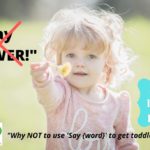By: Paula Johnson, SLP
Those of us who work with families of toddlers find ourselves giving the same advice to many or even most of our families. One of the most common pieces of advice we give is for families to reduce, or better yet stop, telling their toddler to “say [word].” We know this seems counterintuitive. Families want their children to speak, and they may have used this strategy successfully with other children. However, especially for young children with speech and language delays, avoiding “say” can be a valuable strategy to actually encourage MORE words! Why would that be, you may ask?
1. Toddlers don’t love to be told what to do.
As any parent of a toddler can tell you, they can be spirited little creatures who feel strongly about everything! A toddler’s job is to push limits and explore boundaries. Often, telling them what to do will result in exactly the opposite; they might have done what you wanted them to do, but because you told them to do it? Not gonna happen, mom. Instead, we simply model, model, model what we want them to say, without pressure. They are more likely to imitate a sound or word if it feels like their own idea!
2. They may not be able to say it.
Especially if a child is having motor difficulties in producing sounds and words with their mouth, you may be asking them to do something that isn’t possible. Even if it’s a word you’ve heard your child say previously, they may not be able to say it in this moment under these circumstances. We want our little ones to feel comfortable and safe to try out new sounds and words. It’s hard to take risks if you’re afraid to fail!
3. It may decrease initiation of communication.
Our goal for all kids is for them to initiate communication, whatever that looks like at their current level. For some kids, that will mean handing an item to an adult for help or pointing at what they want. Some kids will sign and some will use words. It’s important that we honor their communication attempts because we want them to know that communication is power! Some kids will become dependent on being told what to say if they are prompted too often to “say [x].” A child who says a lot of words but doesn’t use them independently isn’t really communicating as functionally as a child who uses gestures on their own!
So what do we do instead?
When your child points at their cup, our impulse is to tell them to “Say ‘milk!’ Tell me ‘milk, please!’” Let’s make a small but important change. Instead, when your child points to their cup, you can say “Milk! You want milk! Here’s your milk. Mmmmm, yummy milk.” You just gave your child four good models of the word “milk!” They may not say it this time, but you’ve avoided drawing a battle line and also shown your child that their current form of communication (pointing, in this case) has the power to get their wants and needs met.
Another strategy that gets kids talking is incorporating silly sounds (boom, whee, whoa, yippee!) into daily activities. These sounds are fun and often kids are more likely to practice their imitation skills on silly sounds before they feel brave enough to try lots of new actual words. Make using sounds and words silly and fun, and your child is more likely to start trying to say them, too!
As always, if you have concerns about your child’s speech and language development, consult with a speech-language pathologist who can address your child’s specific areas of need.

